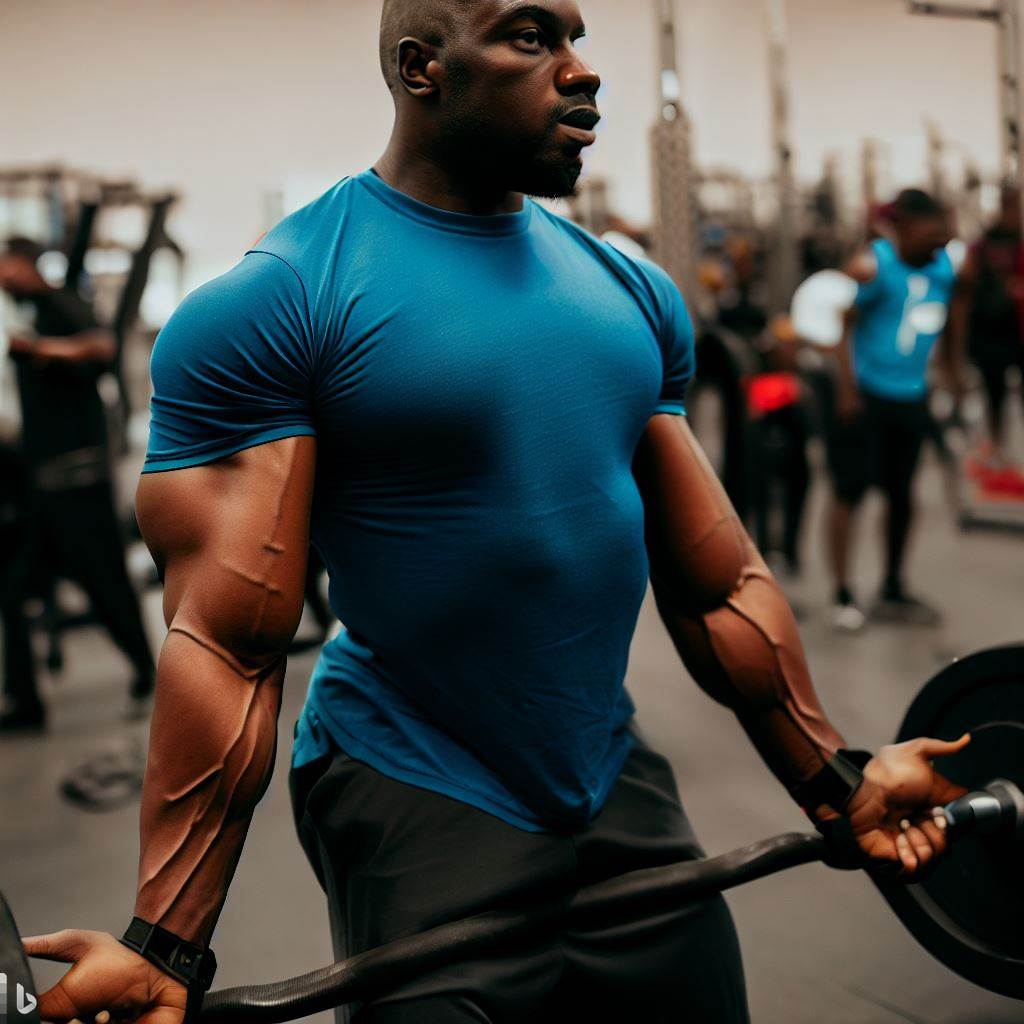Introduction
Certifications are crucial in the field of strength coaching, especially in Nigeria, where they play a significant role.
Having the right certifications not only enhances the credibility of strength coaches but also ensures professional competence.
With the increasing demand for effective training programs, proper certifications become essential.
These certifications provide coaches with the necessary knowledge and skills to design and implement safe and efficient strength training programs.
In Nigeria, where fitness is gaining popularity, the importance of certifications cannot be overemphasized.
It is crucial for strength coaches to possess recognized credentials that demonstrate their expertise and commitment to continuous learning.
Apart from establishing credibility, certifications provide coaches with the necessary tools to navigate the complexities of strength training.
Whether it is understanding biomechanics or implementing proven training methodologies, certifications act as a foundation for success in the field.
Additionally, certifications offer clients the assurance that they are working with knowledgeable professionals who adhere to industry standards.
In a market filled with uncertified coaches, possessing the right certifications can help coaches stand out and attract more clients.
Overall, certifications serve as an assurance of quality and professionalism in the field of strength coaching in Nigeria.
By investing in the right certifications, coaches can ensure they are equipped to deliver exceptional results to their clients and contribute to the growth of the industry.
Importance of Certifications for Strength Coaches
In the field of strength coaching, certifications play a crucial role in Nigeria.
These certifications validate the knowledge and skills of strength coaches, ensuring that they are equipped to provide the best possible training for athletes and clients.
Hiring certified strength coaches can offer numerous benefits to both athletes and clients.
Why certifications are crucial for strength coaches in Nigeria
- Expertise: Certifications ensure that strength coaches possess the necessary expertise in their field.
- Credibility: Certified coaches are viewed as more credible, which helps them establish trust with athletes and clients.
- Safety: Certified coaches are trained in safety protocols and can prevent injuries during training sessions.
- Knowledge: Certifications guarantee that coaches have a solid foundation of knowledge in strength training principles.
Validation of Knowledge and Skills
Certifications act as a validation of knowledge and skills for strength coaches in Nigeria.
- Standardized Curriculum: Certifications follow a standardized curriculum that covers various aspects of strength coaching.
- Practical Application: The certification process involves practical assessments to evaluate coaches’ skills in real-life scenarios.
- Continued Education: Certified coaches are required to participate in continuing education, keeping them updated with the latest industry trends.
- Industry Recognition: Certifications are recognized by the industry, proving that coaches have met specific standards.
Benefits of Hiring Certified Strength Coaches
When athletes and clients hire certified strength coaches in Nigeria, they can reap the following benefits:
- Personalized Training: Certified coaches are skilled in designing training programs tailored to the individual needs and goals of athletes and clients.
- Optimal Performance: With their expertise, certified coaches can optimize athletes’ performance by improving their strength, speed, and agility.
- Injury Prevention: Coaches with certifications have the knowledge to modify training techniques and prevent injuries.
- Goal Achievement: Certified coaches develop effective strategies to help athletes and clients achieve their fitness and performance goals.
- Proper Technique: Certified coaches ensure that athletes and clients use correct techniques during exercises, maximizing results and minimizing the risk of injury.
- Motivation and Support: Certified coaches provide the necessary motivation and support to help athletes and clients stay on track with their training.
Certifications play a vital role in the field of strength coaching in Nigeria.
They validate the knowledge and skills of coaches, ensuring they are equipped to provide safe and effective training.
Hiring certified coaches brings numerous benefits, including personalized training, optimal performance, injury prevention, goal achievement, proper technique, and motivation.
With certifications, strength coaches can make a significant impact on the athletic and fitness journey of their clients.
Read: Roles of an Assistant Coach in Nigerian Sports Teams
Recognized Strength and Conditioning Certifications
List of recognized certifications for strength coaches in Nigeria
- National Strength and Conditioning Association (NSCA) Certified Strength and Conditioning Specialist (CSCS)
- International Sports Sciences Association (ISSA) Certified Strength and Conditioning Specialist (CSCS)
- American Council on Exercise (ACE) Certified Strength and Conditioning Specialist (CSCS)
- National Academy of Sports Medicine (NASM) Certified Strength and Conditioning Specialist (CSCS)
- United States Strength and Conditioning Coaches Association (USSCCA) Certified Strength and Conditioning Specialist (CSCS)
Requirements and eligibility criteria
NSCA CSCS Certification Requirements:
- A bachelor’s degree or currently enrolled in a bachelor’s degree program
- CPR/AED certification
- Passing the CSCS examination
ISSA CSCS Certification Requirements:
- Minimum 18 years of age
- CPR/AED certification
- Completion of the ISSA Certified Personal Trainer course
- Passing the CSCS examination
ACE CSCS Certification Requirements:
- A bachelor’s degree or currently enrolled in a bachelor’s degree program
- CPR/AED certification
- Completion of the ACE Certified Personal Trainer course
- Passing the CSCS examination
NASM CSCS Certification Requirements:
- Minimum 18 years of age
- CPR/AED certification
- A high school diploma or equivalent
- Completion of the NASM Certified Personal Trainer course
- Passing the CSCS examination
USSCCA CSCS Certification Requirements:
- A bachelor’s degree or currently enrolled in a bachelor’s degree program
- CPR/AED certification
- Completion of the USSCCA Certified Personal Trainer course
- Passing the CSCS examination
Credibility and industry recognition associated with these certifications
These certifications are highly credible and recognized in the strength and conditioning industry:
- They are developed and administered by reputable organizations with expertise in the field.
- They require extensive knowledge and skills in strength training, exercise science, and sports conditioning.
- Holding these certifications demonstrates a commitment to professional development and upholding industry standards.
- Employers in the fitness and sports industry value these certifications and often require them for strength coach positions.
- Having these certifications enhances career opportunities and earning potential in the field.
Strength coaches with these certifications have the knowledge and skills to design effective training programs, prevent injuries, and optimize athletic performance.
Furthermore, these certifications provide ongoing education and resources to support strength coaches in staying updated with the latest research and best practices.
Obtaining a recognized certification as a strength coach in Nigeria is crucial for professional growth and industry recognition.
The NSCA CSCS, ISSA CSCS, ACE CSCS, NASM CSCS, and USSCCA CSCS certifications are well-respected credentials that require fulfilling specific requirements and passing a comprehensive examination.
By holding these certifications, strength coaches demonstrate their commitment to professionalism, competence, and ensuring safe and effective training programs for athletes and clients.
Employers and clients recognize these certifications as indicators of credibility and expertise in the field of strength and conditioning.
Therefore, aspiring strength coaches should pursue these certifications to enhance their career prospects and make a positive impact in the fitness and sports industry in Nigeria.
Read: A Career Guide: Becoming an Athletic Director in Nigeria
Top Strength and Conditioning Certification Programs
Top certification programs available for strength coaches in Nigeria
Nigerian Institute of Sports (NIS) Certification Program:
- The NIS certification program focuses on developing well-rounded strength coaches in Nigeria.
- The curriculum covers various aspects such as anatomy, physiology, nutrition, and sports psychology.
- Training modules include practical sessions, case studies, and classroom lectures.
- The examination process consists of both written and practical assessments to ensure comprehensive understanding.
- Unique features of this program include hands-on training with professional athletes and coaches, enhancing practical skills.
International Strength and Conditioning Association (ISCA) Certification Program:
- The ISCA certification program offers a globally recognized qualification for strength coaches.
- The curriculum covers topics like exercise science, biomechanics, program design, and injury prevention.
- Training modules include online lectures, practical demonstrations, and workshops conducted by industry professionals.
- The examination process involves a multiple-choice test and practical evaluation of coaching techniques.
- Advantages of this program include access to an international network of professionals and continuous educational resources.
An overview of the curriculum, training modules, and examination process for each program
National Strength and Conditioning Association (NSCA) Certification Program
- The NSCA certification program is highly esteemed in the field of strength and conditioning coaching.
- The curriculum focuses on exercise physiology, sports nutrition, strength training, and injury prevention.
- Training modules include online courses, in-person workshops, and practical sessions.
- The examination process comprises a computer-based test and a practical examination assessing coaching skills.
- The unique feature of this program is the integration of scientific principles into practical training methods.
Unveiling the Curriculum and Examination Process
When pursuing a career as a Strength Coach in Nigeria, it’s essential to equip yourself with the right certifications.
These certifications not only validate your expertise but also open up new opportunities for career growth.
Let’s delve into the key certifications and gain insights into their curriculum, training modules, and examination process.
National Strength and Conditioning Association (NSCA): Certified Strength and Conditioning Specialist (CSCS)
- Curriculum: CSCS focuses on foundational principles of strength and conditioning, exercise techniques, and program design.
- Training Modules: Comprehensive modules cover topics like anatomy, biomechanics, nutrition, and sports psychology.
- Examination Process: A rigorous exam assesses theoretical knowledge and practical skills, ensuring a well-rounded competence.
American Council on Exercise (ACE): Certified Strength and Conditioning Coach (CSCC)
- Curriculum: ACE emphasizes exercise science, injury prevention, and program customization for diverse clients.
- Training Modules: Modules encompass exercise programming, functional assessments, and client communication.
- Examination Process: ACE’s exam evaluates theoretical knowledge and practical application, ensuring a versatile approach to coaching.
International Sports Sciences Association (ISSA): Certified Strength and Conditioning Specialist (CSCS)
- Curriculum: ISSA offers a comprehensive curriculum covering biomechanics, physiology, and program design.
- Training Modules: Modules focus on exercise prescription, nutrition, and client assessment.
- Examination Process: A practical exam showcases the ability to create effective training programs and provide expert guidance.
American College of Sports Medicine (ACSM): Certified Strength and Conditioning Specialist (CSCS)
- Curriculum: ACSM delves into exercise physiology, sports nutrition, and strength training techniques.
- Training Modules: Modules emphasize injury prevention, client assessment, and program progression.
- Examination Process: ACSM’s exam evaluates knowledge of safe and effective strength training practices.
Unique features and advantages of each certification program
Unveiling the Curriculum and Examination Process
When pursuing a career as a Strength Coach in Nigeria, selecting the right certification program is crucial.
Each program offers unique features and advantages that cater to different preferences and career goals. Let’s explore these distinctions in more detail.
National Strength and Conditioning Association (NSCA): Certified Strength and Conditioning Specialist (CSCS)
- Unique Features: NSCA’s CSCS program is renowned for its depth of knowledge in sports performance and conditioning.
- Advantages: It places strong emphasis on scientific principles and practical applications, making it a preferred choice for coaches aiming to work with elite athletes.
American Council on Exercise (ACE): Certified Strength and Conditioning Coach (CSCC)
- Unique Features: ACE’s CSCC program is known for its practical approach and versatility in working with diverse client populations.
- Advantages: It provides a well-rounded education, focusing on injury prevention and effective program customization, which is ideal for coaches catering to a wide range of clients.
International Sports Sciences Association (ISSA): Certified Strength and Conditioning Specialist (CSCS)
- Unique Features: ISSA’s CSCS program stands out for its flexibility, allowing students to learn at their own pace.
- Advantages: It covers a broad spectrum of topics and offers practical experience in creating customized training programs, making it suitable for self-paced learners.
American College of Sports Medicine (ACSM): Certified Strength and Conditioning Specialist (CSCS)
- Unique Features: ACSM’s CSCS program is highly respected for its emphasis on exercise physiology and research.
- Advantages: It provides a deep understanding of the science behind strength training, making it an excellent choice for those interested in a research-oriented approach.
Each certification program holds distinct advantages, so your choice should align with your career aspirations and the client base you intend to serve.
In the next section, we’ll delve deeper into the benefits of each program, helping you make an informed decision to advance your career in Nigeria’s fitness industry.
There are several top certification programs available for strength coaches in Nigeria.
Each program has its own unique curriculum, training modules, and examination process.
Read: Assistant Athletic Trainers: Impact on Nigerian Sports

Benefits of Obtaining Certifications for Strength Coaches
Certifications for strength coaches in Nigeria can provide numerous advantages and open up various career growth opportunities.
These certifications can give strength coaches the necessary credibility and establish trust with athletes and clients.
Advantages in Terms of Career Growth and Opportunities
- Increased Job Market Competitiveness: Certified strength coaches have a competitive edge over non-certified individuals.
- Enhanced Professional Development: Certifications enable coaches to continually update their knowledge and skills.
- Access to Specialization: Certification programs offer specialized training in areas such as nutrition, rehabilitation, and sport-specific strength training.
- Networking Opportunities: Certification programs often provide access to industry events and connections with other professionals.
- Career Advancement Possibilities: Certifications can pave the way for promotions and leadership roles within organizations.
Credibility and Establishing Trust
Obtaining certifications gives strength coaches an added level of credibility and allows them to establish trust with athletes and clients.
- Demonstrated Expertise: Certifications showcase a coach’s knowledge and competency in their field.
- Validation of Skills: Certifications provide evidence of a coach’s ability to design effective training programs.
- Assurance of Safety: Certified coaches are trained to prioritize safety, reducing the risk of injuries for athletes and clients.
- Professional Standards: Certifications ensure that coaches adhere to industry best practices and ethical guidelines.
- Enhanced Communication: Clients and athletes trust certified coaches and are more likely to follow their advice and recommendations.
Potential Increase in Earning Potential
Strength coaches who hold certifications often experience a boost in their earning potential.
- Market Demand: With certifications, coaches become attractive to universities, professional teams, and private clients.
- Premium Rates: Certified coaches can command higher fees due to their specialized knowledge and credibility.
- Career Advancement: Higher-paying positions, such as head strength coach or consultant, are often reserved for certified professionals.
- Business Opportunities: Certified coaches can establish their own training facilities or consultancy businesses.
- Longevity in the Field: Certifications provide stability and ensure career longevity in the highly competitive fitness industry.
Obtaining certifications as a strength coach in Nigeria offers a wide range of benefits.
These include increased career growth opportunities, credibility and trust-building with clients, and a potential increase in earning potential.
Investing in certifications not only enhances a coach’s professional development but also opens up doors to a successful and fulfilling career in the field of strength coaching.
Read: Roles of Athletic Directors in Nigeria’s Sports Scene
Challenges and Considerations
Challenges and considerations that strength coaches in Nigeria may face while pursuing certifications
Strength coaches in Nigeria may encounter various challenges and considerations when pursuing certifications.
These challenges can include:
- Cost of certifications can be a significant barrier for strength coaches in Nigeria.
- Access to quality training resources and materials may be limited.
- The timing of certification courses may clash with other professional or personal commitments.
Suggestions and resources to overcome these challenges
To overcome these challenges, strength coaches in Nigeria can consider the following suggestions and resources:
- Look for affordable certification options, scholarships, grants or financial aid programs available for aspiring coaches.
- Explore online platforms and e-learning resources that offer cost-effective certification courses.
- Collaborate with local sports organizations or universities that may provide training opportunities or sponsorships.
- Seek mentorship and guidance from experienced strength coaches who can offer advice and support.
- Utilize online forums, social media groups, and networking platforms to connect with other professionals and share knowledge.
- Invest in self-study materials, such as books, videos, and online tutorials, to enhance knowledge and skills.
By being proactive and resourceful, strength coaches in Nigeria can navigate the challenges associated with certification and enhance their professional growth.
It is essential to remember that continuous learning and networking play a crucial role in overcoming these obstacles and becoming successful in the field.
Conclusion
To conclude, obtaining certifications for strength coaches in Nigeria is of paramount importance.
These certifications provide numerous benefits such as credibility, job opportunities, and increased earning potential.
Aspiring strength coaches should strongly consider pursuing certification programs to gain a competitive edge in the industry.
Furthermore, continuous professional development should be a priority for strength coaches.
By staying updated with the latest research and techniques through workshops, seminars, and courses, coaches can enhance their skills and deliver exceptional results to their clients.
In a field as dynamic as strength coaching, certifications and continuous learning are crucial in ensuring a successful career.
By investing in their professional development, strength coaches can position themselves as trusted and knowledgeable experts, and contribute to the growth of the industry as a whole.
So, for those who aspire to become strength coaches in Nigeria, take the leap and pursue certification programs.
The benefits outweigh the investment, and it will open doors to a world of opportunities and personal growth. Remember, knowledge is power, and continuous learning is the key to success!




